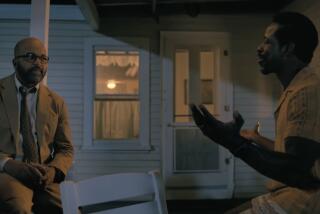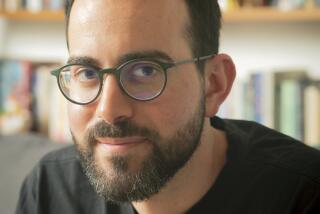Russia Targets Writer in Porn Investigation
It is safe to say that this is not a prudish city. Here, erotic dancing is standard restaurant entertainment. Television networks broadcast frontal nudity during prime time and soft porn after midnight. Some teen girls describe prostitution as a glamorous profession.
So when Moscow’s general prosecutor opened a pornography investigation Thursday against a prominent writer who has won several literary prizes, many would be forgiven for considering the move at least inconsistent, perhaps even hypocritical.
“It is a big book, and there are only two bed scenes in it,” said Vladimir Sorokin, author of the offending tome, “Blue Lard.”
Sorokin, 46, is a member of Russia’s “postmodern” writers movement. He acknowledges that his 3-year-old book includes foul language and ribald scenes but insists that its purpose is literary.
“My book is not pornographic,” the long-haired, goateed writer said in a telephone interview. “The goal of pornography is to turn readers on sexually, whereas my book is a requiem to Russian literature.”
“Blue Lard” is a disjointed, surrealistic fantasy laden with obscene language and literary allusions. Political and literary figures from various epochs interact, sometimes carnally. They include Josef Stalin, Adolf Hitler and revered Russian writers such as Fyodor Dostoevsky, Anton Chekhov and Anna Akhmatova.
Critics have taken particular umbrage at one scene, in which Stalin has sex with his eventual successor, Nikita S. Khrushchev. But fans point out that such episodes come across as comical. They compare Sorokin’s style to James Joyce--a cerebral writer who revels in vulgarity.
Except no one claims that Sorokin is on a level with Joyce or even Russia’s heretofore most renowned “pornographic” writer, Vladimir Nabokov.
“Some experts might consider a few of his scenes to be pornographic, but that alone can’t make him a pornographic author,” said writer and critic Alexander Kabakov. “I believe he is too cold-headed for that. He writes from his head rather than from his emotions. In this sense he has a long way to go before he could stand next to Henry Miller, for example.”
The investigation, on charges of “distributing pornography,” is believed to be the first against a writer in the post-Soviet period. And this being Russia, most everybody assumes that the anti-Sorokin campaign is part of some kind of conspiracy.
Despite President Vladimir V. Putin’s new pro-Western foreign policy, many liberals see this as one more sign that social controls are increasing at home. They point to the fact that officials from the former KGB and its main successor agency, the Federal Security Service, or FSB, are increasingly holding top government jobs. Two Russian journalists who asked “improper” questions during a Putin news conference last month have been disciplined, with one fired. An FSB spokesman was recently appointed to serve as “chief of security” at the state television network RTR.
“I see this [investigation] as an indication that what these forces really want is the resurrection of censorship in Russia,” Sorokin said.
The pornography investigation was begun after weeks of campaigning by a political youth movement called Marching Together. In the most publicized event, Marching Together activists threw copies of Sorokin’s books into an enormous toilet bowl outside the Bolshoi Theater. The activists said they were protesting the Bolshoi’s decision to commission an opera libretto from Sorokin.
“This marks the beginning of the moral recuperation of society,” said Denis Zaitsev, spokesman for Marching Together. “We consider the beginning of this process a sign that the era of marginal writers--who describe in obscene language all possible perversions and publicly promise to bury our literature--is coming to an end.”
Marching Together is strongly pro-Putin--its logo is a portrait of the president--which raises the question of whether and to what extent the anti-Sorokin campaign has Kremlin backing.
“No doubt we are dealing with a political case,” said Mikhail Kotomin, deputy director of Ad Marginem, which published Sorokin’s book. “This should be a very good test for the authorities.”
For their part, government officials quickly distanced themselves from the investigation.
“Literary creation is a very delicate thing,” said Culture Minister Mikhail Y. Shvydkoi. “I wouldn’t pose here as an expert. I am not a fan of Sorokin, but I will protect his right to expression.”
Shvydkoi said he believes that the campaign was concocted as a publicity stunt for Marching Together, a view shared by Kabakov, the critic.
Whether by accident or design, the anti-Sorokin campaign does appear to work in Putin’s favor: It gives his backers a chance to stand for traditional values while providing the president an opportunity to silence critics by defending Sorokin’s freedom of expression.
At least so far, the campaign seems to be a win-win situation for all involved, even its putative targets: Sorokin, whose name recognition has skyrocketed, and his publisher, which has seen sales of “Blue Lard” rise sharply.
“Thanks to this scandal, we are having quite a good trade in books by Sorokin,” said Yelena Skudina, who operates a book kiosk near a central Moscow metro station. “I’m selling at least five ‘Blue Lards’ a day, which is very good business by our standards.”
*
Sergei L. Loiko of The Times’ Moscow Bureau contributed to this report.
More to Read
Sign up for our Book Club newsletter
Get the latest news, events and more from the Los Angeles Times Book Club, and help us get L.A. reading and talking.
You may occasionally receive promotional content from the Los Angeles Times.






